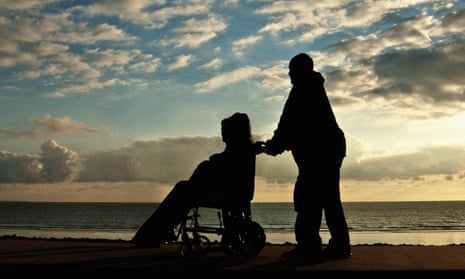Families of people with dementia have said there is a national crisis in care safety as it emerged that more than half of residential homes reported on by inspectors this year were rated “inadequate” or requiring improvement – up from less than a third pre-pandemic.
Serious and often shocking failings uncovered in previously “good” homes in recent months include people left in bed “for months”, pain medicine not being administered, violence between residents and malnutrition – including one person who didn’t eat for a month.
In homes in England where standards have slumped from “good” to “inadequate”, residents’ dressings went unchanged for 20 days, there were “revolting” filthy carpets, “unexplained and unwitnessed wounds” and equipment was ”encrusted with dirt”, inspectors’ reports showed.
Nearly one in 10 care homes in England that offer dementia support reported on by Care Quality Commission inspectors in 2022 were given the very worst rating – more than three times the ratio in 2019, according to Guardian analysis.
While 880 dementia care homes were rated good this year, 160 were rated inadequate. The Relatives and Residents Association (RRA), which operates a national helpline, said “these horrific statistics sadly echo what we hear”.
The investigation was sparked after the Guardian in November exposed care staff at a £2,400 a week Surrey care home physically and mentally abusing Ann King, 88, who had dementia, in what the care minister, Helen Whately, described as “devastating footage”.
It comes amid predictions that 1.6 million people in the UK’s ageing population will have dementia by the middle of the century, up from nearly 1 million today. The disease is already the biggest killer in England and costs of dealing with it are expected to more than double to £80bn by 2040.
In May 2022, the then health secretary, Sajid Javid, promised that a national 10-year dementia strategy would be published by the end of this year but it is now delayed. Officials at the Department for Health and Social Care said only that details would come “in due course”.
“This national crisis is happening behind closed doors but in plain view of those with the power and duty to protect the rights of people placed in the most vulnerable of positions who often cannot speak up for themselves,” said Helen Wildbore, the director of RRA.
Caroline Abrahams, charity director at Age UK, said: “There’s no real sense the government has a grip on the problem.”
“Too little has been done to help social care recover from the battering it received during the pandemic, let alone improve,” she said.
Residential dementia care is largely provided by private companies rather than the NHS in a sector facing a severe funding crisis leaving one in 10 posts vacant, pay lower than supermarkets and pubs, and large numbers of care homes without enough staff to properly cover shifts. Family visits remain restricted in some homes, raising concerns about a lack of oversight.
Martin Green, the chief executive of Care England, which represents the largest private operators, said staff shortages and council funding for 24-hour care places of as little as £4 a hour, meant “it is little wonder care levels will slip”. He also alleged inspectors were taking a tougher approach than before and “not understanding what the pressures are”.
As well as delaying the dementia strategy, in the last two months the government postponed funding reform to deliver its promise to “fix social care”, the House of Lords warned adult social care is “becoming ever-more distanced from a service that might enable [people] to live a life of their choice” and England’s leading social services chief, Sarah McClinton, said the scale of unmet need was now “staggering”.
According to recent inspection reports examined by the Guardian, in Yorkshire, one inspector had to break up a fight between residents in a home where there were “not always enough staff deployed to meet people’s needs and keep them safe”. In a Derbyshire home where pain medicine ran out, inhalers went uncleaned and none of the staff were trained in managing falls, one resident fell from their bed or chair 12 times in four weeks.
“Families tell us they feel bereft,” said Wildbore. “They are left to fight an uphill battle against poor care which cannot improve without proper investment and reform, even to ensure all staff have the skills to communicate with people living with dementia.”
She fears the problems may be “the tip of the iceberg” with less than half the number of inspections taking place in 2022 than in 2019.
Since Covid, inspectors have been increasingly making “risk-based” assessments going in mostly when concerns have been raised, which the CQC said may account for a slight increase in the worst ratings.
But the proportion of care homes in England which offer dementia services branded inadequate by the CQC more than tripled from 2% to 9% between 2019 and 2022, while the percentage found to be good or outstanding fell from 71% to 49%.
In a Lincolnshire care home downgraded to inadequate from good, people had been deprived of their liberty without legal authority, including using guard rails to stop people getting out of bed. Staff admitted: “I don’t read care plans,” and the manager worried “what happens when I leave the building”.
At a Cambridgeshire home “people had been in bed for months”. In Warwickshire staff dosed residents with pain and anxiety medication “without appropriate rationale” and in Derbyshire several assaults between residents were not investigated. In Dorset one person missed 31 consecutive doses of constipation medicine, and residents were dressed in each other’s clothes and left with food around their mouths.
In total 160 homes offering dementia services in England were ranked inadequate in the first 11 months of 2022 with many branded “not safe”. A further 762 homes were labelled “requires improvement”, 880 were “good” and just 11 were “outstanding”.
“One of the challenges is getting the right workforce,” said Green. “The government approach to vaccination [mandating it for care staff for five months before a U-turn] lost us 30,000 workers. It is very difficult to get staff who might specialise in dementia. Local authority funding is working out at just £4 here to provide 24-hour care, three meals a day, making sure people have their drug regime and managing challenging behaviour.”
Kate Terroni, chief inspector of adult social care at the CQC said: “It is essential that people living with dementia receive the best possible care. We are committed to supporting providers to drive improvements in dementia care in England. As part of our new strategy we are changing the way we regulate services and support our teams to better understand the care people with dementia receive.”
The Department of Health and Social Care said the care minister, Helen Whately, was not available for interview. A spokesperson highlighted additional funding to “tackle dementia waiting lists and increase the number of diagnoses” and said: “We have committed to double the funding for dementia research to £160m a year by 2024/25.”
“We have prioritised social care in the autumn statement, making up to £7.5bn over the next two years available to support adult social care and discharge – the biggest funding increase in history,” they said.
The department has said it wants “a society where every person with dementia, their families and carers receive high quality, compassionate care, from diagnosis through to end of life”.










